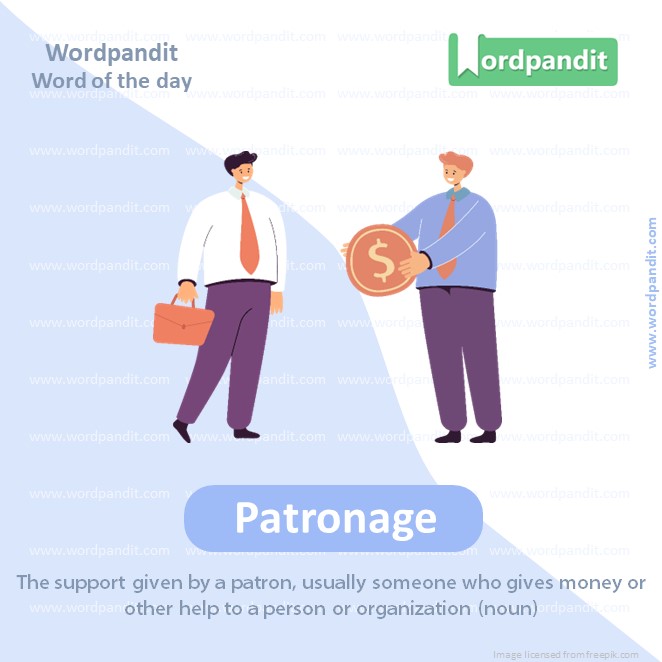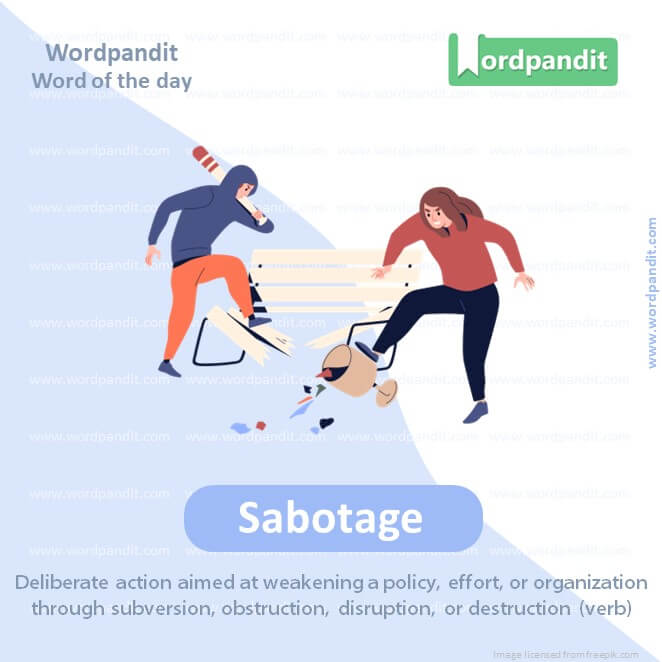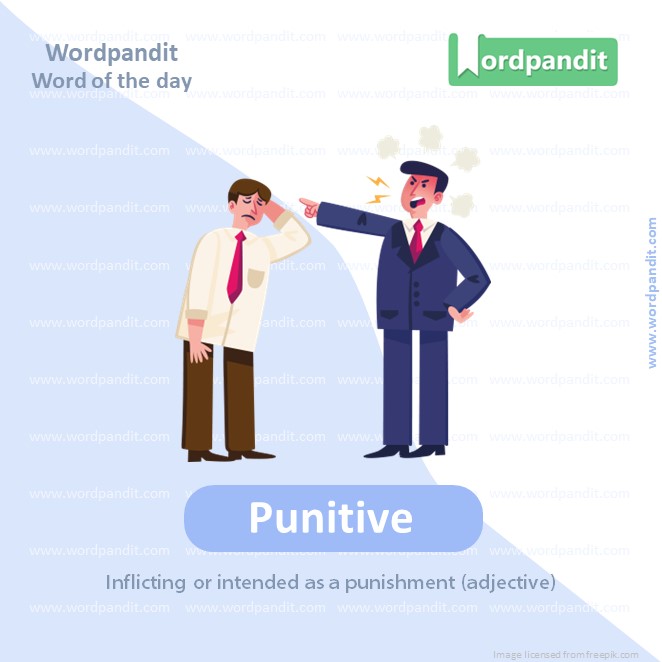Daily Vocabulary Words: List of Daily Used Words
Hi there. Welcome to this special section @ Wordpandit.
Our endeavour here is straightforward: highlighting important daily vocabulary words, you would encounter in The Hindu. This is your repository of commonly used words; essentially, we are posting a list of daily used words. Hence, this has significant practical application as it teaches you words that are commonly used in a leading publication such as The Hindu.
Visit the website daily to learn words from The Hindu.

WORD-1: Patronage
CONTEXT: electoral politics has thrown up a set of politicians who are in it to build a career more out of patronage and less out of ideological conviction.
SOURCE: The Hindu
EXPLANATORY PARAGRAPH: Imagine you go to the same ice cream shop every week because you love their chocolate ice cream. The shop likes you because you always come back. This is like patronage – it’s when you keep going back to the same place because you like it, and they are happy because you help their business.
MEANING: The support given by a patron, usually someone who gives money or other help to a person or organization (noun).
PRONUNCIATION: PA-truh-nij
SYNONYMS: Support, sponsorship, backing, funding, endorsement
USAGE EXAMPLES:
1. She enjoys the patronage of the local bakery, where she buys bread every morning.
2. The artist found patronage from a wealthy family.
3. The museum’s new exhibit is thanks to the patronage of its donors.
4. The library was built with the patronage of the townspeople.

WORD-2: Sabotage
CONTEXT: His cynical ploy was to sabotage politics, by strengthening extremists such as Hamas at the expense of more credible and popular Palestinian forces.
SOURCE: The Hindu
EXPLANATORY PARAGRAPH: Let’s say you built a tower of blocks, and someone sneaks up and knocks it down on purpose so you can’t play anymore. That’s like sabotage – it’s when someone messes something up on purpose so it doesn’t work right.
MEANING: Deliberate action aimed at weakening a policy, effort, or organization through subversion, obstruction, disruption, or destruction (verb).
PRONUNCIATION: SAB-uh-tahzh
SYNONYMS: Undermine, subvert, disrupt, damage, wreck
USAGE EXAMPLES:
1. The computer crash was due to an act of sabotage by a disgruntled employee.
2. He was accused of trying to sabotage the project’s success.
3. The team suspected sabotage when their equipment failed.
4. Rumors spread that the election had been affected by sabotage.

WORD-3: Resuscitated
CONTEXT: India resuscitated the Line of Control ceasefire, and it re-tasked a dedicated Pakistan-facing Strike Corps to the China border.
SOURCE: The Hindu
EXPLANATORY PARAGRAPH: If your favorite toy stopped working and you replaced the batteries to make it work again, that’s like resuscitated. It means to make something or someone come back after they have stopped working or been very sick.
MEANING: To revive someone from unconsciousness or apparent death (verb).
PRONUNCIATION: re-SUS-i-tay-ted
SYNONYMS: Revive, rejuvenate, restore, recover, revitalize
USAGE EXAMPLES:
1. The doctors resuscitated the man after he had stopped breathing.
2. The old park was resuscitated with new playground equipment.
3. She successfully resuscitated the wilting plant with water and care.
4. The charity was resuscitated by a large donation.

WORD-4: Punitive
CONTEXT: new punitive attack options such as in Balakot, and may even be involved in the mysterious assassinations of several anti-India terrorist leaders in Pakistan.
SOURCE: The Hindu
EXPLANATORY PARAGRAPH: If you take a cookie when you’re not supposed to, and your parents give you a time-out, that’s punitive. It means when someone does something wrong, they get a punishment to teach them not to do it again.
MEANING: Inflicting or intended as a punishment (adjective).
PRONUNCIATION: PYOO-ni-tiv
SYNONYMS: Penalizing, disciplinary, corrective, retributive, castigating
USAGE EXAMPLES:
1. The court imposed a punitive fine on the company for breaking the law.
2. Punitive measures were taken against the students who cheated on the exam.
3. The new law included punitive actions for polluters.
4. Their coach took punitive steps to ensure discipline in the team.
WORD-5: Irrevocably
CONTEXT: the Kashmir dispute is now irrevocably non-negotiable, and maintains that it will not reopen talks with Pakistan as long as cross-border terrorism exists.
SOURCE: The Hindu
EXPLANATORY PARAGRAPH: When you paint a picture and you can’t erase the paint once it’s on the paper, that’s irrevocably. It means something is done in a way that can’t be changed or taken back.
MEANING: In a way that cannot be changed, reversed, or recovered (adverb).
PRONUNCIATION: i-REV-uh-kuh-blee
SYNONYMS: Permanently, unalterably, irreversibly, unchangeably, finally
USAGE EXAMPLES:
1. His decision was made irrevocably, with no chance of changing his mind.
2. The landscape was irrevocably altered by the new highway.
3. The contract, once signed, is irrevocably binding.
4. The trust between them was irrevocably broken.
WORD-6: Entrenched
CONTEXT: Dialogue will not extinguish the Pakistan Army’s entrenched anti-India ideology, and even less, the fervour of its terrorist allies.
SOURCE: The Hindu
EXPLANATORY PARAGRAPH: Imagine if you built a fort and made it super strong so it’s hard for anyone to change it. Entrenched is like that fort; it means something is so fixed and strong that it’s not easy to change.
MEANING: Firmly established and difficult to change (adjective).
PRONUNCIATION: en-TRENCHT
SYNONYMS: Ingrained, rooted, embedded, fixed, established
USAGE EXAMPLES:
1. The company has an entrenched position in the market.
2. These traditions are deeply entrenched in the community.
3. His habits are so entrenched that he cannot break them.
4. Entrenched beliefs often take time to change.
WORD-7: Buttressing
CONTEXT: They have incentives in buttressing economic stability, building capacity to counter anti-state terrorism, and reducing their dependence on China.
SOURCE: The Hindu
EXPLANATORY PARAGRAPH: Imagine you’re making a tall tower of cards and you add more cards to the sides so it doesn’t fall over. Buttressing is like when you make something stronger by supporting it.
MEANING: Providing support or reinforcement for something (verb).
PRONUNCIATION: BUH-tris-ing
SYNONYMS: Strengthening, supporting, reinforcing, bolstering, shoring up
USAGE EXAMPLES:
1. The arguments were buttressed with solid facts.
2. The new pillars were built to buttress the old bridge.
3. They buttressed the case with new evidence.
4. The team was buttressed by the addition of new players.
WORD-8: Neutrality
CONTEXT: this argument is fundamentally flawed and sets a dangerous precedent that undermines the principle of net neutrality.
SOURCE: The Hindu
EXPLANATORY PARAGRAPH: If two friends are arguing and you don’t take a side, you’re staying neutral. Neutrality is when you decide not to support either side in an argument or fight.
MEANING: The state of not supporting or helping either side in a conflict or disagreement (noun).
PRONUNCIATION: noo-TRAL-i-tee
SYNONYMS: Impartiality, nonpartisanship, fairness, objectivity, detachment
USAGE EXAMPLES:
1. Switzerland is known for its policy of neutrality during wars.
2. The judge must maintain neutrality when making a decision.
3. The organization claimed neutrality in the political debate.
4. He approached the dispute with a sense of neutrality.

WORD-9: Avaricious
CONTEXT: The attempt of telcos to double dip by charging both consumers and content providers is not avaricious.
SOURCE: The Hindu
EXPLANATORY PARAGRAPH: If someone wants to keep all the toys and doesn’t want to share any, that’s being avaricious. It means being really greedy and wanting more and more for oneself.
MEANING: Having or showing an extreme greed for wealth or material gain (adjective).
PRONUNCIATION: av-uh-RISH-us
SYNONYMS: Greedy, covetous, acquisitive, grasping, materialistic
USAGE EXAMPLES:
1. The avaricious businessman was always looking for ways to make more money.
2. His avaricious nature led him to take more than his fair share.
3. The avaricious ruler taxed his people heavily.
4. Avaricious collectors hoard art without appreciating it.
WORD-10: Articulation
CONTEXT: The idea has been developed over time, but its modern articulation may be largely credited to Columbia Law School
SOURCE: The Hindu
EXPLANATORY PARAGRAPH: When you build with blocks, you put them together so they fit well. Articulation is like that, but with words; it’s when you speak or connect your thoughts clearly so people can understand you.
MEANING: The clear and precise expression of ideas or feelings (noun).
PRONUNCIATION: ar-TICK-you-lay-shun
SYNONYMS: Enunciation, expression, clarity, coherence, eloquence
USAGE EXAMPLES:
1. The teacher praised her for her clear articulation of the subject.
2. Good articulation is important for a public speaker.
3. He struggled with the articulation of his emotions.
4. The robot’s joints have smooth articulation.
vocabulary correction
Vocabulary correction plays a critical role in enhancing the eloquence of our verbal and written communication. It is necessary to conquer the nuances of a language and get the message across clearly.
Learning vocabulary correction shouldn’t come across as a daunting task laden with an overbearing list of complicated words. In fact, it’s a lifelong journey that evolves continuously with constant learning and usage. So, how exactly does one embark on this journey of vocabulary correction?
Initially, it’s essential to read extensively. Make books, newspapers, blogs and scholarly articles your best friends. They are the potential wellsprings of words waiting to enrich your vocabulary. As you come across unfamiliar words or phrases, have a dictionary and thesaurus handy to comprehend their meanings and usage.
Next, regularly engaging in vocabulary games and quizzes is a fun method of vocabulary correction that shouldn’t be understated. Not only does it expand your knowledge, but it also tests your current vocabulary prowess. Word puzzles, crosswords, and language learning mobile applications offer great platforms for this.
Writing is another powerful tool for effective vocabulary correction. Jotting down thoughts, ideas, or chronicling day-to-day experiences helps us weave words together, enhancing our vocabulary use. You look for the right words to express yourself, and in the process, you learn the correct usage of previously unfamiliar words.
No course of vocabulary correction is complete without active conversation. Engaging in meaningful dialogues introduces us to different styles and manners of speech. We pick up new words and expressions that we may not stumble upon during solitary reading or writing.
Lastly, vocabulary correction involves continuous practice and diligence. Language learning is not a one-and-done deal. It’s a consistent task of engaging, experimenting, and adapting. Remember, vocabulary correction can be monumentally effective education; make sure you learnt it the right way.










